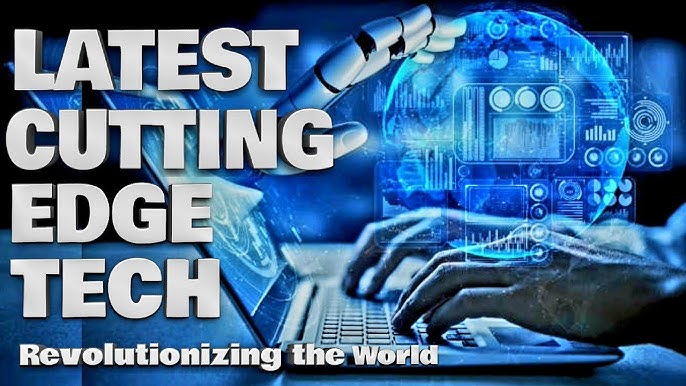Exploring Cutting Edge Technologies: Trends That Are Revolutionizing Industries
The rapid pace of technological innovation is reshaping the world as we know it, bringing significant changes to nearly every sector. From AI to blockchain, and from quantum computing to autonomous systems, we are witnessing the rise of groundbreaking technologies that are revolutionizing industries across the globe. These cutting-edge advancements are not only improving efficiency and productivity but also creating new opportunities and transforming the way businesses operate, and how we live our everyday lives. In this article, we will explore some of the most transformative trends in technology that are changing industries in profound ways.
1. Artificial Intelligence (AI) and Machine Learning
AI and machine learning (ML) are among the most disruptive technologies of our time, making their impact felt across multiple industries, including healthcare, finance, retail, and manufacturing. By enabling machines to learn from data and make decisions without human intervention, AI is automating processes and enhancing decision-making across sectors.
AI in Healthcare
- Diagnostic Tools: AI-powered systems are revolutionizing diagnostics. Machine learning algorithms can analyze medical images, such as X-rays and MRIs, to detect abnormalities like tumors with high accuracy.
- Personalized Medicine: AI enables more personalized healthcare treatments, predicting patient outcomes and suggesting tailored treatment plans based on individual health data.
- Drug Development: AI accelerates the drug discovery process by analyzing vast datasets to identify potential compounds and predict how they might interact with biological systems.
AI in Finance
- Fraud Detection: AI systems are increasingly used by financial institutions to detect fraudulent transactions by analyzing patterns and anomalies in real time.
- Robo-Advisors: AI-powered robo-advisors help individuals manage their investments by providing personalized financial advice based on their risk profiles and goals.
AI in Retail
- Customer Personalization: Retailers are using AI to analyze consumer behavior, offering personalized recommendations and dynamic pricing models.
- Supply Chain Optimization: AI helps businesses predict demand, optimize inventory management, and improve delivery logistics.
2. Blockchain Technology
Blockchain, the decentralized ledger technology that underpins cryptocurrencies, is transforming industries far beyond digital currencies. Its ability to provide secure, transparent, and immutable records has made it an invaluable tool for sectors like supply chain management, healthcare, and finance.
Blockchain in Supply Chain
Blockchain allows businesses to track products from raw material to final delivery in a transparent and secure way. This can help reduce fraud, verify authenticity, and ensure that goods meet quality standards.
- Transparency and Traceability: Blockchain can ensure that products, particularly those in the food and pharmaceutical industries, are traceable from source to store, reducing counterfeiting and increasing trust among consumers.
Blockchain in Healthcare
- Data Security and Privacy: Blockchain offers secure storage of patient data and ensures privacy by allowing individuals to control who has access to their personal information.
- Interoperability: Blockchain allows healthcare systems to share data across different platforms while maintaining security, ensuring better collaboration among healthcare providers.
Blockchain in Finance
- Smart Contracts: Blockchain enables self-executing contracts with pre-determined terms, eliminating the need for intermediaries like lawyers and notaries, reducing costs, and speeding up processes.
- Cross-Border Payments: Blockchain allows for faster, more secure international money transfers, lowering transaction fees and simplifying remittance services.
3. Quantum Computing
Quantum computing is on the brink of solving problems that classical computers can’t, thanks to its ability to process vast amounts of information simultaneously. While still in its early stages, quantum computing is expected to have a significant impact on industries like pharmaceuticals, logistics, and cybersecurity.
Quantum Computing in Drug Discovery
Quantum computers can simulate complex molecular structures much more efficiently than classical computers. This ability could drastically accelerate drug discovery and the development of new therapies for diseases like cancer, Alzheimer’s, and rare genetic disorders.
Quantum Computing in Logistics
Quantum computing can optimize complex logistics and supply chain problems, such as determining the most efficient routes for delivery trucks, reducing fuel consumption, and improving inventory management.
Quantum Computing in Cybersecurity
Quantum computing has the potential to break current encryption methods, which is a concern for data security. However, it also promises the development of quantum encryption techniques that are virtually unbreakable, providing enhanced security for sensitive information.
4. 5G Technology
5G is the next generation of mobile network technology, offering faster speeds, lower latency, and more reliable connectivity than current 4G networks. Its rollout is expected to transform industries by enabling faster, more efficient communication and enabling new use cases for connected devices.
5G in Healthcare
- Remote Surgery: With ultra-low latency, 5G will make remote surgery a reality. Surgeons could operate on patients in real time, regardless of their location, using robotic arms controlled by high-speed internet.
- Telemedicine: 5G will improve telemedicine by allowing doctors to conduct high-quality video consultations with patients, even in remote areas, making healthcare more accessible.
5G in Autonomous Vehicles
5G will enable vehicles to communicate with each other and with infrastructure (such as traffic signals and road sensors) in real time, which will be crucial for the safe operation of autonomous vehicles. This will help optimize traffic flow, reduce accidents, and improve the overall efficiency of transportation networks.
5G in Smart Cities
The roll-out of 5G networks will facilitate the development of smart cities by connecting everything from streetlights to waste management systems, enabling efficient urban management and improving the quality of life for citizens.
5. Augmented Reality (AR) and Virtual Reality (VR)
Augmented Reality (AR) and Virtual Reality (VR) are immersive technologies that are set to revolutionize industries like gaming, education, retail, and real estate. While AR overlays digital content on the real world, VR creates an entirely simulated experience.
AR in Retail
- Virtual Try-Ons: AR allows customers to try on clothes, makeup, and accessories virtually, enhancing the shopping experience and reducing returns.
- Interactive Shopping Experiences: Retailers can use AR to create immersive store experiences, allowing customers to visualize products in their homes before making a purchase.
VR in Healthcare
- Medical Training: VR is being used to train surgeons and medical professionals in a controlled, risk-free environment. This helps in developing skills through realistic simulations.
- Therapeutic Uses: VR is being explored for therapeutic applications such as pain management, PTSD treatment, and cognitive therapy.
AR/VR in Education
- Immersive Learning: AR and VR enable students to experience history, geography, and science firsthand through simulations and virtual field trips. This enhances engagement and improves learning outcomes.
- Remote Learning: These technologies will enhance the remote learning experience, allowing students to interact with complex concepts in a more hands-on manner.
6. Internet of Things (IoT)
The Internet of Things (IoT) refers to the interconnected network of devices that communicate and share data with each other. From smart homes to connected factories, IoT is transforming how industries and consumers interact with the world around them.
IoT in Manufacturing
- Predictive Maintenance: IoT sensors in manufacturing equipment can predict when machinery will fail, allowing for proactive maintenance and reducing downtime.
- Smart Factories: IoT enables factories to automate processes and monitor production systems in real-time, improving efficiency and reducing costs.
IoT in Agriculture
- Precision Agriculture: IoT sensors can monitor soil moisture levels, temperature, and other environmental factors to optimize irrigation, crop rotation, and pest control, leading to more efficient and sustainable farming practices.
IoT in Smart Homes
- Home Automation: IoT devices like smart thermostats, lighting systems, and security cameras offer homeowners greater control over their living environment, improving comfort, energy efficiency, and security.
Conclusion
Cutting-edge technologies are rapidly changing the landscape of industries across the globe. From AI and blockchain to quantum computing and 5G, these innovations are transforming the way businesses operate, interact with customers, and deliver products and services. The future holds great promise, as these technologies continue to evolve and unlock new possibilities in sectors ranging from healthcare and finance to manufacturing and retail.
As we embrace these advancements, it’s crucial for industries and governments to manage their implementation responsibly and ethically, ensuring that they benefit society as a whole while minimizing risks. The ongoing development of these technologies is reshaping industries in ways we’ve only begun to imagine, offering exciting opportunities for the future.
Key Takeaways:
- AI and Machine Learning are transforming healthcare, finance, retail, and manufacturing, enabling automation and data-driven decision-making.
- Blockchain is enhancing transparency, security, and efficiency in industries like supply chain, healthcare, and finance.
- Quantum Computing promises to solve complex problems in drug discovery, logistics, and cybersecurity.
- 5G Technology will accelerate the adoption of IoT, improve healthcare access, and enable the growth of autonomous vehicles and smart cities.
- AR and VR are revolutionizing retail, healthcare, and education by offering immersive and interactive experiences.
- IoT is driving efficiency in manufacturing, agriculture, and home automation, creating smarter environments and optimized processes.

